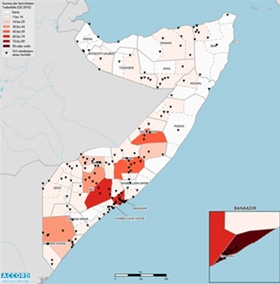ACCORD publishes overviews on conflict events based on ACLED data
ACCORD publishes a series of overviews on conflict events in selected countries. These overviews are based on data collected by the Armed Conflict & Location Event Data Project (ACLED).
ACLED, a non-governmental organization registered in the USA (www.acleddata.com), collects data on conflict events in a range of African and Asian countries. Most of the data is taken from public sources, additional data comes from local partners.
Based on the ACLED data, ACCORD creates overviews and maps on conflict events for the following countries:
Algeria, Egypt, DR Congo, India, Kenya, Libya, Mali, Morocco, Myanmar, Nigeria, Pakistan, Senegal, Somalia, South Sudan, Sudan and Tunisia.
For other important countries of origin, like Afghanistan, Syria or Iraq, currently no data are available.
 The overviews created by ACCORD serve an easier access to the ACLED data. The full ACLED datasets contain further information for each event, like brief notes on the incident, the source, and information on the precision level of the date or geographic information.
The overviews created by ACCORD serve an easier access to the ACLED data. The full ACLED datasets contain further information for each event, like brief notes on the incident, the source, and information on the precision level of the date or geographic information.
The data collection does not purport to be exhaustive. Fatality data particularly is vulnerable to bias and inaccurate reporting, and ACLED uses the most conservative estimate available. Furthermore, event data may be revised or complemented in future updates. The lack of information on an event in this report does not permit the inference that it did not take place.
The overviews compiled by ACCORD are available on ecoi.net, as of February 2016 annual and quarterly overviews for 2014 and 2015 for the African countries mentioned above are available. For the Asian countries annual and quarterly updates are available for 2014, and the first two quarterly updates for 2015. ACCORD will continue to compile these overviews, based on the availability of ACLED data.
ACLED themselves also publishes brief reports and analyses based on their data collection. ACLED has been added to the sources regularly covered by ecoi.net.
We thank ACLED for the kind permission to use their datasets.